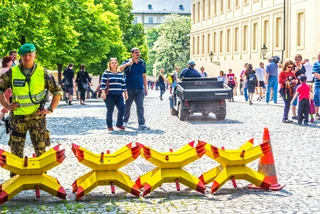Prague, March 20 (CTK) – The number of the confirmed novel coronavirus cases reached 774 in the Czech Republic this morning, while nine new cases were registered since midnight, according to the data on the Health Ministry’s website released today.
The number of new cases rose by 205 on Thursday, which was the so far highest daily increase.
A total of 11,619 people have been tested for the coronavirus in the country to date.
Four patients have recovered from the COVID-19 so far.
Health Minister Adam Vojtech (for ANO) announced the information about the fourth cured patient later today, adding that this was a woman from the Moravia-Silesia Region.
On Monday, the first three people, all from Decin, north Bohemia, recovered the COVID-19 disease. They were among the first to have got infected upon return from skiing in Italy.
“Although we keep watching a growing number of positive cases, good news also appears. The fourth patient has recovered! It is a woman from Moravia-Silesia Region. I am quite happy and I believe that the number of the cured will be growing,” Vojtech said.
The Czech Republic has no COVID-19 fatalities so far.
The Thursday number of coronavirus cases in Czechia were closely under the government projection and if Czechs do not observe the government orders, the measures must be tightened, Prime Minister Andrej Babis (ANO) told reporters today after a plane with healthcare material from China landed in Prague.
He called on citizens to follow the restrictions. Babis is convinced that if all observed them, the coronavirus incidence rise would be curbed.
Babis said the government has a mathematical model of the epidemic development, while the Thursday numbers are just closely under the expectations.
National Crisis Staff head Roman Prymula , an epidemiologist by profession, said on Czech Television (CT) on Thursday that the number of the new coronavirus cases may reach up to 15,000 in Czechia by mid-April, the projected peak. But he expected the adopted measures to considerably lower the figures, he added.
The Health Ministry is to release the numbers of people in home quarantine on suspicion of the coronavirus infection today.
Vojtech said on Thursday that 63 of the infected are hospitalised, while five are in a serious condition.
According to the regional sanitary stations, that do not take all positive test results, including labs, into consideration, there are 557 people with the proven COVID-190 infection in the country.
The biggest number of the infected is still in Prague (121), followed by Central Bohemia (91). The lowest number is in the Liberec Region with seven cases. Men (301) prevail among the infected over women (256).
As far as the age groups are concerned, the highest number of the virus cases, 110, is in the group aged from 35 to 44 years, man dominating among them (71).
In the group of the elderly over 65, who are considered the most endangered group, 73 infection cases were proved, with men prevailing.
A total of 40 percent contracted the coronavirus abroad, mainly in Italy and Austria, but also in Germany, the United States, Spain, Britain, Belgium, Ireland, Egypt, France, Israel, Switzerland and Hungary, Slovakia, Thailand, Greece, Sweden, Albania, Indonesia, Portugal, the United Arab Emirates and Netherlands. The rest of the patients got infected in the Czech Republic.
The Central Crisis Staff is to meet again later today. President Milos Zeman will debate the coronavirus outbreak with PM Andrej Babis (ANO) in the presidential manor in Lany near Prague tonight. Another government meeting cannot be ruled out.
The first cases of the novel coronavirus infection appeared in the Czech Republic on March 1.
The government has declared the state of emergency, which has seriously limited the free movement of people and cancelled most public activities.












 Reading time: 3 minutes
Reading time: 3 minutes 



























